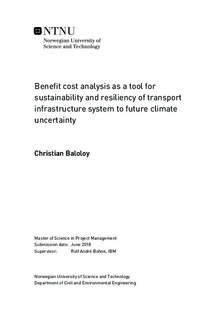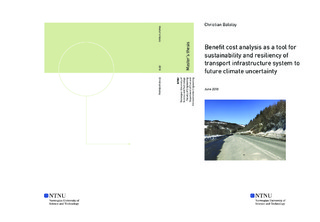| dc.description.abstract | Climate Change is a challenge that produces uncertainties among decision-makers in determining which type of investments are robust enough to mitigate infrastructures vulnerabilities. So, adaptation strategies and policies are imposed by some governments and/or organizations worldwide to address various impacts, susceptibilities and constraints. However, there is quite a little attention given to the costs and benefits of climate change adaptations.
Using a quantitative approach which I have stated in Chapter 3 and using a case study E6 Soknedal project in Chapter 4 of this thesis, I have managed to analyse and assess the adaptation measures in terms of their costs and benefits and even disbenefits. By looking specifically, with the aid of NPRA, the culverts system, I have generated a more thorough evaluation of what possible and probable risks may affect the decision on the type of investment that would be necessary for a project to attain sustainability and resiliency. With focus on the flood risk that may be a climate change effect on that road segment which is along a river, the Bayesian framework addressed some probabilities and uncertainties that could be present in the project.
In addition, the study looked into the existing road and the new road project replacing the existing. By investigating three different types of investment by sensitivity analysis, polynomial regression and decision tree analysis, a medium type of investment which is half new construction and half maintenance would be more optimal in terms of benefits over costs. This means that a risk of overly- and underinvesting may be minimised.
In conclusion, the Benefit Cost Analysis is a suitable tool to measure the sustainability and resiliency of infrastructure systems to future climate uncertainty. Through various analyses associated with BCA, there is no doubt that decision-makers would be secured in choosing the necessary option to invest to adapt to climate change. It must be, however, noted that the uncertainties that the future climate may bring are ambiguous. Thus, a proactive approach into taking account the impacts would be fitting. Furthermore, it is highly advised to meticulously perform sensitivity analysis of any assumptions or estimations made. This can result into a more optimal investment decision considering how vast and varied the climate change impacts may be in the future. | |

